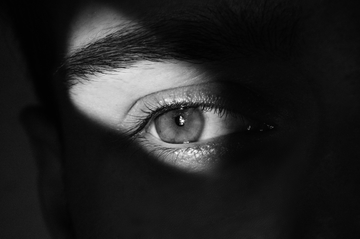Imagine this is your last memory. Passing your Christmas present, a small box, wrapped in green and red stripes, into your boyfriend’s hands. His smiling eyes give you a warm glow that radiates through your body. Your first Christmas with his family. The Christmas tree laden with dazzling decorations in the background invading the entire corner of the lounge room. An array of presents still unopened scattered under the tree’s low overhanging branches. An assortment of shapes, sizes so colourfully wrapped. You hear the muffled voice of your boyfriend saying something, you can’t make it out. His lips are moving, he becomes hazy as if he isn’t really in front of you. Your head pounding with a sudden excruciating sharp pain.
Gone.
You wake up.
Your eyes overwhelmed by the bright lights blaring, screaming at you. You can’t speak. Your mouth feels dry. It feels sore. You smell disinfectant and alcohol wipes. There is a lot of white everywhere. Sheets on beds, white walls, white ceiling. Stunned, sterile, surreal. People in hospital scrubs moving about. The clanging sounds of metal, the busy voices of authority, serious discussions, chatter. You blink many times struggling with the sensations you feel. You start to feel anxious, tears flow, you blink even more. You feel your heart racing. You try to move your arms but they are tied down somehow. Your head is heavy on the pillow and you can’t lift it to see around you. Your body doesn’t seem to know it is there. It is light and floaty. You hear your breathing, beeps, buzzers. Your throat, oh the horrible choking feeling in your throat you want it gone. You start to panic. You want to yell for help. No one can hear you, there is no voice. You feel a plastic thing coming through your mouth. You feel a tube in your nose. Breathe, you breathe, where is your breath?
Someone unfamiliar comes close into your gaze. They peer into your eyes. You feel a warm hand on your upper arm. Their face is kind, they speak gently and clearly to you. Breathe, breathe. They tell you just to breathe. She says she is a nurse and you are in hospital, in the intensive care unit. You have been here for a month. You are intubated and the balloon on the enteral tracheal tube gives that uncomfortable feeling in the throat. She says you are safe, you are okay. Your hands are restrained to the side of the bed to make sure you don’t pull out the tube that is keeping you alive. You can’t respond. You can’t ask questions. You feel trepidation with all the medical words. You have to just succumb to your body’s needs and all the devices. But you are reassured, your breathing settles into a slower rate and your heart slows from its galloping pace.
They explain you have been in a coma and you are now getting better. You had some blood vessels rupture in your brain. You don’t know what to make of all this. It’s confusing.
Later you learn that you collapsed from an intracranial haemorrhage on Christmas Day. It happened because of an abnormality of the blood vessels from when you were born. You were rushed to hospital. You nearly died.
Your mind wonders back to your last memory.
Four years on, at the age of 26, my beauty therapist inspired this story of her almost fatal demise though this isn’t her story or her words. We had a random conversation while I was having some waxing done. We talked about the remarkable human brain and how she now noticed a change in how she feels and responds to her world. It’s both the effect of the trauma to the brain but also the knowing that she actually almost died.
I wondered what it would feel like to have four weeks of your life that you can’t ever remember. Some intensive care units keep diaries to help account for that time filled with messages and stories detailing the care and love given, the daily routines, the challenges and decisions made. It has to be one of the most vulnerable times of your life, the time dedicated to healing the brain.
Neurosurgeons know how to operate on the brain’s physical structures however I am fascinated by the important work of neuropsychologists who analyse the changes in the brain following a brain trauma like that in this story. They are also interested in the behaviours, thoughts, feelings and quality of life changes that arise from any disturbance to normal brain function caused by diseases such as dementia and brain tumours. There are many excellent examples of the work of neuropsychologists and one worth reading is Dr Amee Baird’s book “Sex on the brain”. She describes the difference between these professions. She says of neurosurgeons and the brain, that they “suck and cut bits out of them put things into them, and relieve pressure from them”. Whereas neuropsychologists are interested in “post-operative changes in cognitive or thinking skills such as memory”.
Changes to the brain can be considerable following surgery. Not anyone person’s brain is similar and people can report changes in personality, emotions and feelings. There are new insights too in the area of brain plasticity. The brain has the capacity to change itself well into advancing years. This presents us with hope, to know that the brain, like a muscle, can be exercised, trained and challenged in ways that can greatly improve our life no matter what interruption it’s had to its physical structure.

